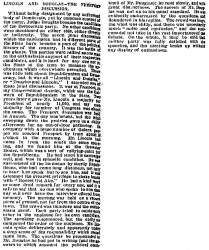Record Data
Transcription
LINCOLN AND DOUGLAS – THE FREEPORT DISCUSSION.
Without being designated by any authorized body of Democrats, yet by common consent of the party, Judge Douglas became the candidate of the Democratic party. No other candidates were mentioned on either side, either directly or indirectly. The seven joint discussions which the candidates had in different parts of the State have become a part of the political history of the country. It was the battle of the giants. The parties were [railed?] as one man to the enthusiastic support of their respective candidates, and it is hard for any one not in the State at the time to measure the excitement which everywhere prevailed. There was little talk about Republicanism and Democracy, but it was all “Lincoln and Douglas,” or “Douglas and Lincoln.” I attended one of these joint discussions. It was at Freeport, in my Congressional district, which was the bulwark of Republicanism in the State. Two years later it gave Mr. Lincoln a majority for President of nearly 14,000 and my own majority for member of Congress was about the same. The Freeport discussion was held in August. The day was bright, but the wind sweeping down the prairies gave us a chilly afternoon for an out-of-door gathering. In company with a large number of Galena people we reached Freeport by train about 10 o’clock in the morning. Mr. Lincoln had come in from the south the same morning. And we found him at the Brewster House, which was a sort of rallying-point for the Republicans. He had stood his campaign well, and was in splendid condition. He was surrounded all the forenoon by sturdy Republicans, who had come long distances, not only to hear him speak but to see him, and it was [esteemed?] the greatest privilege to shake hands with “Honest Old Abe.” He had a kind word or some droll remark for every one, and it is safe to say that no one who spoke to him that day will ever have the interview effaced from memory. The meeting was held on a vacant piece of ground, not far from the centre of the town. The crowd was immense, and the enthusiasm was great. Each party tried to outdo each other in the applause for [its?] own candidate. The speaking commenced, but the chilly air dampened the ardor of the audience. Mr. Lincoln spoke deliberately and apparently under a deep sense of the responsibility which rested upon him. The questions he propounded to Mr. Douglas he had put in writing (and the answers to which sounded the political death-knell of Mr. Douglas); he read slowly, and with great distinctness. The speech of Mr. Douglas was not up to his usual standard. He was evidently embarrassed by the questions, and floundered in his replies. The crowd was large, the wind was chilly, and there was necessarily much “noise and confusion,” and the audience did not take in the vast importance of the debate. On the whole, it may be said that neither party was fully satisfied with the speeches, and the meeting broke up without any display of enthusiasm.





